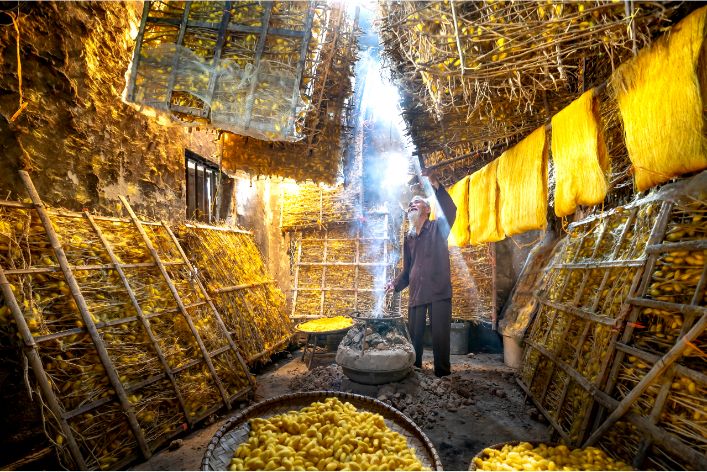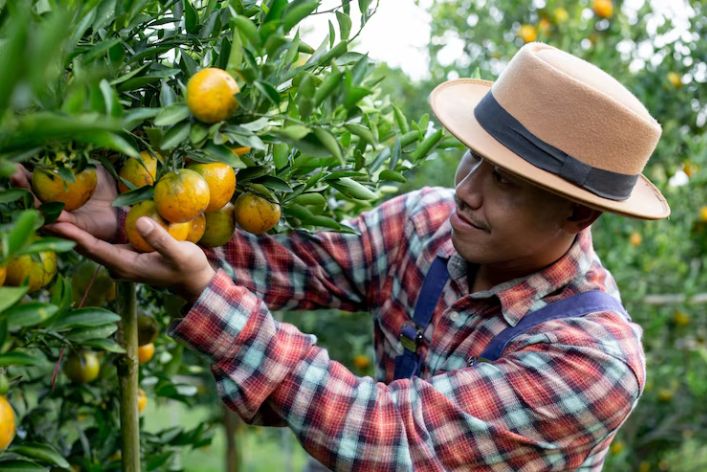Introduction
Sericulture is the practice of rearing silkworms for silk production. It has been in existence for centuries and has played a significant role in various cultures worldwide. Silk farming is an essential industry that provides numerous economic benefits to countries that specialize in it.
Silk is a valuable commodity both domestically and internationally, and its demand continues to increase.
Sericulture has the potential to generate significant revenues for Nigeria’s fragile economy, as silk farming is a lucrative business that requires minimal input.
The Nigerian government has recognized the importance of sericulture and is taking steps to promote its growth and development in the country. It is hoped that the industry will contribute to diversifying the country’s sources of revenue.
In essence, sericulture is an ancient practice with immense economic potential that is yet to be fully tapped in Nigeria.
The country has the ideal weather conditions and an abundance of cheap labor to produce high-quality silk. With the right support and investment, sericulture can be a game-changer for Nigeria’s economic growth.
Read: Career Spotlight: Livestock Farming Jobs in Nigeria
Background on Silk Farming in Nigeria
Silk farming, also known as sericulture, is the process of rearing silkworms for the production of silk. In Nigeria, silk farming has been existence for a long time and has grown to become a potential source of income for many households.
History of Silk Production in Nigeria
- Silk farming was introduced to Nigeria in the 1950s by British colonial rulers.
- The production and processing of silk were mainly carried out in the Northern part of Nigeria, particularly in Kano state.
- Initially, silk farming was a cottage industry that was dominated by women, and it served as a means of income generation for households in the region.
- Over time, silk production in Nigeria declined due to the rise of synthetic fabrics and other challenges.
Challenges Faced by Silk Farmers in Nigeria
- High cost of inputs: Silk farming requires specialized equipment, including mulberry trees, silkworms, rearing sheds, and harvesting machines, which can be expensive to procure.
- Inadequate funding: Most silk farmers in Nigeria have limited access to credit, which restricts their ability to expand their silk production operations.
- Poor infrastructure: The lack of good roads, storage facilities, and electricity supply are significant challenges that affect the silk production value chain in Nigeria.
- Pest and disease management: Silkworms are highly susceptible to diseases and pests, which can cause significant losses for farmers.
Government Efforts to Promote Silk Farming
- The Nigerian government has initiated various programs aimed at promoting silk farming and enhancing the value chain of silk production in the country.
- The government established the National Centre for Agricultural Mechanization (NCAM) as a research and training center that provides technical support to silk farmers across the country.
- The Federal Ministry of Agriculture and Rural Development provides financial support and technical assistance to silk farmers through state agricultural development programs.
- The government has also encouraged the establishment of private sector-driven silk production value chains to boost the sector’s growth.
Essentially, silk farming in Nigeria has the potential to be a significant source of income for farmers and contribute to the nation’s economic growth.
The challenges facing silk farmers in Nigeria are significant, but with adequate support from the government and private sector, the industry can be revitalized to benefit millions of households across the country.
Read: Nigeria’s Agricultural Extension Services: Career Scope
Benefits of Silk Farming
Economic Benefits
Silk farming is a lucrative business that generates a lot of income for farmers and other stakeholders. The production of silk is a labor-intensive process that creates employment opportunities for many people.
In countries like China and India, silk farming has been a major source of income for centuries.
Silk products like clothing, scarves, and ties have a high demand in the global market, which makes them valuable exports.
Silk farming in Nigeria has the potential to create a new stream of revenue for the country and help reduce its dependence on oil exports.
Health Benefits of Silk
It’s not only beautiful but also beneficial to health. Silk fibers are hypoallergenic and natural, making them gentle and safe on the skin. Silk bedding and clothing can prevent skin irritation, acne, and allergies, improving the overall health of individuals.
Additionally, silk fibers are breathable and smooth, ensuring good airflow around the body. This property of silk makes it an ideal material for creating comfortable clothing for people with sensitive skin.
Environmental Benefits
Silk farming is a sustainable practice that has minimal impact on the environment. Unlike synthetic materials, silk is biodegradable and does not pose a threat to the environment.
Silk production does not require the use of harmful chemicals, making it an eco-friendly alternative to many other fabrics. The use of natural dyes in silk production also reduces the harmful effects of chemical dyes on the environment.
Moreover, silk farming promotes the conservation of silkmoth species, which are essential to the production of silk fibers. Through silk farming, farmers are incentivized to protect and preserve the silkworms, ensuring the continuity of the species and the production of this luxurious fabric.
Generally, the benefits of silk farming are numerous and impactful. Silk farming offers economic opportunities, promotes individual health and wellbeing, and helps preserve the environment.
Starting a silk farm in Nigeria could be an excellent investment opportunity, not just for farmers but also for the country as a whole.
With its unique climate and abundant natural resources, Nigeria has all it takes to become a leading silk producer in Africa and beyond.

Read: Aquaculture Careers: Profiting from Nigeria’s Waters
Steps to Starting a Silk Farm in Nigeria
Choosing the Right Location
- Find a location with stable temperatures around 25-30°C and humidity of 70-80%.
- Choose an area with low rainfall to avoid flooding and high wind speeds that can damage the cocoons.
- Make sure there is easy access to water sources for your silk worms to drink from.
Choosing the Right Type of Silk Worms
- Purchase eggs or young worms from reputable silk distributors.
- Choose a species of silk worm that is suitable for the climate in your region.
- Consider the amount of silk you want to produce and the market demand in your area.
Preparing the Land
- Clear the land of any debris, weeds, or other materials that could contaminate the silk worms’ food source.
- Treat the soil with organic fertilizers to enhance the quality of the mulberry leaves.
- Construct a silkworm house with proper ventilation to maintain optimal temperature and humidity levels.
Caring for the Silk Worms
- Feed the silk worms fresh mulberry leaves daily.
- Keep the silkworm house clean and free of debris.
- Monitor the temperature and humidity levels regularly to make necessary adjustments.
Harvesting the Silk Cocoons
- Wait until the cocoons have fully developed before harvesting them.
- Use a sharp tool to carefully cut the cocoons from the branch without damaging them.
- Store the cocoons in a cool, dry place until ready for processing.
Processing the Silk
- Boil the cocoons to remove the sericin (the sticky substance that holds the cocoon together).
- Use a spindle or spinning wheel to carefully extract the silk fibers.
- Wash and dry the extracted silk fibers before weaving or selling them.
Starting a silk farm in Nigeria can be a profitable venture with the right preparation and care for the silk worms. By following these steps, you can ensure a successful harvest of high-quality silk for the market.
Market Opportunities in Silk Farming
As with any business venture, it is important to consider the available market opportunities for silk farming in Nigeria. Here are some factors to keep in mind:
Domestic Market Opportunities
- Nigeria’s population of over 200 million presents a large potential market for silk products.
- There is a growing interest in locally-made and sustainable products in the Nigerian market.
- Silk fabrics are highly valued for their quality and durability, making them a potentially lucrative addition to the fashion industry.
- With Nigeria’s strong cultural heritage, there may also be opportunities to market silk products for traditional wear and ceremonies.
Export Market Opportunities
- The global market for silk products is estimated to be worth billions of dollars, with growing demand in emerging markets such as Nigeria.
- There is potential to tap into the lucrative Asian market, where silk products have a strong cultural value and are in high demand.
- With the African Continental Free Trade Area (AfCFTA) now in force, there may be opportunities to export silk products to other African countries.
- Nigeria’s status as a major agricultural exporter also presents opportunities to leverage existing trade channels and networks to export silk products to international markets.
Potential for Value Addition
- Silk farming offers opportunities for value addition, such as processing raw silk into finished products like scarves, shawls, and ties.
- The production of non-traditional silk products like silk soap, body lotions, and cosmetics can also add value to the market.
- Investment in research and innovation can help identify new and innovative uses for silk that can increase its value and demand in the market.
- Linkages with other sectors such as fashion, tourism, and hospitality can also help to create additional market opportunities and boost the economic potential of silk farming in Nigeria.
Basically, the market potential for silk farming in Nigeria is significant. With the right support and investment, the industry has the potential to contribute to economic growth, job creation, and export earnings.
Challenges and Solutions
- Lack of Access to Capital: One of the major challenges of silk farming is lack of access to capital. The capital needed to start and maintain the farm can be quite high, making it difficult for budding farmers to break into the industry.
- Solution: To overcome this challenge, potential silk farmers can explore various channels to access capital.
This includes partnering with investors, seeking out bank loans or government grants, collaborating with an established silk farmer or applying for crowd-funding.
- Lack of Training and Technical Know-How: Another challenge that silk farmers face is the lack of proper training and technical knowledge.
- Solution: To overcome this challenge, training programs should be set up to provide prospective silk farmers with the necessary technical expertise.
Additionally, partnering with experienced silk farmers or enrolling in courses or workshops can be helpful in obtaining the required knowledge and skills
- Poor Infrastructure: Poor infrastructure is a significant challenge in many African countries, and Nigeria is no exception. Power supply, inadequate transportation systems, and limited access to technology can hinder the growth of silk farming.
- Solution: To overcome this challenge, stakeholders such as the government and private sector can invest in building better infrastructure that supports silk farming.
This includes funding for research and development of new technologies, improving transportation networks, and expanding access to electricity and communication systems.
Therefore, it is clear that the challenges facing silk farming in Nigeria and other African countries are significant. However, with proper planning and execution, these obstacles can be overcome.
By accessing capital, obtaining proper training and technical knowledge, and creating better infrastructure, the silk farming industry in Nigeria can grow and succeed.
Read: The Rise of Agri-tech Jobs in Nigeria’s Economy
Conclusion
After exploring the potential of sericulture in Nigeria, it is clear that this industry is ripe for growth and development.
With a favorable climate and a growing global demand for silk, there is no better time than now for entrepreneurs and investors to venture into this sector.
However, the success of sericulture in Nigeria is not solely dependent on private sector investment. Government support and promotion is crucial in creating an enabling environment for the industry to thrive.
This includes policies and initiatives aimed at improving access to finance, training, and markets for silk products.
Finally, sericulture presents an exciting opportunity for Nigeria to diversify its agricultural sector and tap into a lucrative global market.
It is up to entrepreneurs, investors, and policymakers to take advantage of this potential and drive the growth of the industry.
So, to all budding entrepreneurs and investors out there, don’t be afraid to take the leap into sericulture. The rewards could be immense!




